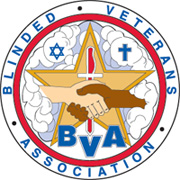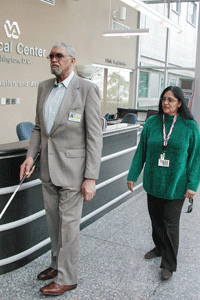Blinded Veterans Association (BVA)
 | With a mission to help blinded veterans and their families lead happy, productive lives, the Blinded Veterans Association (BVA) has been, for 65 years, a beacon of light to those who have experienced vision loss. |
| From its humble beginnings, BVA has been a strong advocate for world-class VA Orientation and Mobility training for veterans who experience vision loss. Pictured here, BVA member Maurice Toler receives instruction from O&M Instructor Vijaya Dabir at Washington, DC VA Medical Center. |  |
History of BVA
BVA traces its beginnings back to the final days of World War II, when a courageous group of approximately 100 recovering service members, blinded in combat gathered together in a brotherly union at an Army Convalescent Hospital near Avon, Connecticut. The result of the historic meeting, which began at 8:45 a.m. on March 28, 1945, was a lasting institutional framework through which blinded veterans could help and serve one another for decades to come.
Instrumental in the early history of BVA and crucial to its survival was a trust fund set up within the American Foundation for the Blind (AFB). In addition, a faithful advisor and morale booster during the Association’s early years was Kathern “Kay” Gruber, AFB’s Director of Services for the War Blind.
On the occasion of its 65th anniversary, BVA is a nonprofit Veterans Service Organization of more than 11,000 members and chartered by the United States Congress to be the exclusive voice for blinded veterans before the legislative and executive branches of government.
Eligibility
All legally blinded veterans, now estimated to be 158,000 nationwide, are eligible for membership. An overwhelming majority of this number are seniors who have lost their sight as a result of age-related Macular Degeneration, Glaucoma, Retinitis Pigmentosa, and Diabetic Retinopathy. There is no charge for any of the services provided to both members and nonmembers of the organization. A National BVA Auxiliary organization and its local regional groups are composed of spouses, relatives, and friends of blinded veterans. The Auxiliary and its members support the BVA mission and provide voluntary service to individual blinded veterans.
Services to Seniors
BVA services to seniors include full-time Field Service Representatives, blinded veterans themselves, in various parts of the country. Field reps provide inspiration, encouragement, and practical assistance in the Department of Veterans Affairs (VA) benefit claims process. They understand the complexities and emotions behind the process because they have been through similar experiences. They are effective role models in helping newly blinded veterans find and follow the road to independence. A meaningful adjunct to the BVA Field Service Program, and an important vehicle for assistance to blinded veterans, are the more than 60 volunteer offices in VA Medical Centers, regional offices, and outpatient clinics.
What BVA Does
Provides a Voice for Blinded Veterans
Since its small beginnings, BVA has been a strong voice for blinded veterans in a variety of venues. In addition to its annual presentation of legislative priorities before a joint session of the House and Senate Committees on Veterans Affairs, BVA presented oral and written testimony to Congress seven times in 2009 on legislation affecting both recently injured service members and older veterans with vision loss. Throughout the year, BVA also educates members of Congress about the needs of blinded veterans. The Association works closely with VA to assure that all blinded veterans have access to its world-class rehabilitation training programs, technology, and counseling. It collaborates with organizations of and for the blind in assuring that all blind individuals are afforded the rights, services, and accommodations they both deserve and have earned.
Disseminates Information
One of BVA’s most significant responsibilities is that of disseminating information and offering practical help to blinded veterans and their families. The organization promotes public awareness of sight loss through its website (www.bva.org), display tables at community events, media campaigns, and its quarterly magazine entitled the BVA Bulletin.
Provides Scholarships
Scholarship funds are available annually to the spouses and dependents of children/grandchildren of blinded veterans, regardless of whether the blinded veterans are actually members of BVA. Eligibility for the funds is also not limited to the families of veterans whose blindness is connected to their military service.
Offers Support
Regional groups, which number 54 across the country, offer blinded veterans support, friendship, and opportunities for recreation and socializing with one another. They also provide a locally-based organization through which blinded veterans can unite together to effect change in the national organization. The groups also work to bring about change in the customs, ordinances, and attitudes toward the blind and visually impaired in their local communities.
Holds National Convention
Gatherings of the BVA membership nationally are the much anticipated annual conventions. This year’s 67th National Convention in Galvestion, Texas, for example, brought members together to draft resolutions in the setting of official business meetings and to participate in guest speaker forums, panel discussions, workshops, and training sessions on issues relating to both blindness and veterans. The convention exhibit hall featured companies wishing to introduce new products and technologies relating to vision loss.